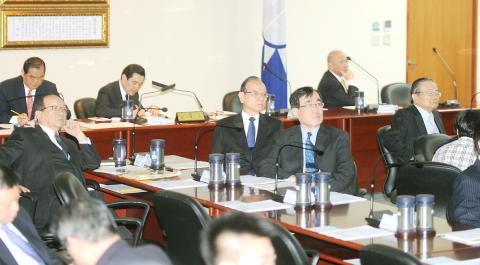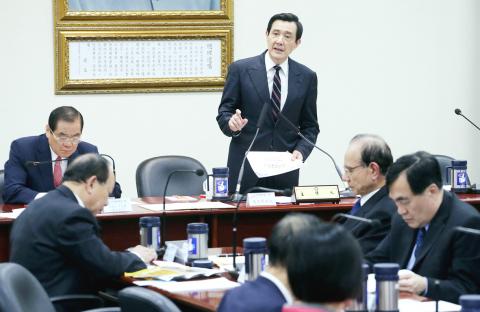President Ma Ying-jeou (馬英九), who also serves as Chinese Nationalist Party (KMT) chairman, yesterday nominated Taipei Mayor Hau Lung-bin (郝龍斌), New Taipei City Mayor Eric Chu (朱立倫) and Greater Taichung Mayor Jason Hu (胡志強) as the party’s vice chairmen.
The nominations were approved during a meeting of the KMT Central Standing Committee yesterday afternoon, after three of the six incumbent KMT vice chairmen — Lin Feng-cheng (林豐正), Chan Chun-po (詹春柏) and John Chiang (蔣孝嚴) — tendered their resignations recently.
The personnel reshuffle was touted as part of the KMT’s endeavor to reform the party following the conclusion of the 24-day student-led Sunflower movement, which occupied the legislature to protest against the KMT caucus and the Ma administration’s handling of the cross-strait service trade agreement last month.

Photo: Fang Pin-chao, Taipei Times
“The KMT and the nation are facing an enormous challenge right now. Since the heads of local governments have a better grasp of public opinion, [serving as KMT vice chairmen] will allow us to better express the opinions of the people to the higher echelons of the party and therefore help them formulate better policies,” Hau said on the sidelines of a press conference for sheltered workshops in Taipei yesterday.
“We should shoulder the responsibility together and do our utmost to assist the party,” Hau said.
When asked for comment, Chu said Ma informed him of the nominations on Tuesday night and the president expressed hope that the trio would serve as a bridge between the party and the people after they assume their roles.

Photo: CNA
However, Chu dismissed speculations linking the personnel change to the party’s strategic plans for the 2016 presidential election, saying: “It is only meant to facilitate better communication between local governments and the administrative and legislative branches of the government.”
Hu said that although he had previously said that he had no intention of taking over as KMT vice chairman, he accepted the nomination because “every KMT member is obliged to unite to save the party in a time of crisis.”
“I will do everything in my power to be a vice chairman who serves as the voice of the people and bring improvements to the party,” Hu said.
Most KMT members welcomed the decision.
KMT Legislator Lin Tsang-min (林滄敏) said the three incoming chairmen’s administrative experience was an asset to the KMT because it would help the party with its policymaking.
KMT Legislator Chi Kuo-tung (紀國棟) said that while Chan, Chiang and Lin Feng-cheng were highly respected in the KMT, it was better to have someone who could represent the party and carry out certain functions to serve as the party’s vice chairmen.
“The nominations should have been made long ago,” Chi said.
However, some Democratic Progressive Party (DPP) lawmakers disapproved of the nominations.
DPP Legislator Lee Chun-yi (李俊俋) was quoted by the Chinese-language Apple Daily as saying that Ma’s motive for designating the trio as party vice chairmen was to consolidate his power and to silence their criticism against the party and the government.
DPP Legislator Huang Wei-cher (黃偉哲) was quoted as saying that the nominations were a ploy by Ma to tame his enemies and that the trio might have only accepted the offer to avoid being alienated by the president.
“Ma previously offered the vice chairman position to Legislative Speaker Wang Jin-pyng (王金平). Wang declined, and Ma has treated him as a sworn enemy ever since,” Huang said.

The Ministry of Economic Affairs has fined Taobao NT$1.2 million (US$36,912) for advertisements that exceed its approved business scope, requiring the Chinese e-commerce platform to make corrections in the first half of this year or its license may be revoked. Lawmakers have called for stricter enforcement of Chinese e-commerce platforms and measures to prevent China from laundering its goods through Taiwan in response to US President Donald Trump’s heavy tariffs on China. The Legislative Yuan’s Finance Committee met today to discuss policies to prevent China from dumping goods in Taiwan, inviting government agencies to report. Democratic Progressive Party Legislator Kuo Kuo-wen (郭國文) said

The Ministry of Economic Affairs has fined Taobao NT$1.2 million (US$36,900) for advertisements that exceeded its approved business scope and ordered the Chinese e-commerce platform to make corrections in the first half of this year or its license would be revoked. Lawmakers have called for stricter supervision of Chinese e-commerce platforms and more stringent measures to prevent China from laundering its goods through Taiwan as US President Donald Trump’s administration cracks down on origin laundering. The legislature’s Finance Committee yesterday met to discuss policies to prevent China from dumping goods in Taiwan, inviting government agencies to report on the matter. Democratic Progressive Party

Taiwan and its Pacific ally Tuvalu on Tuesday signed two accords aimed at facilitating bilateral cooperation on labor affairs, according to Taiwan’s Ministry of Foreign Affairs (MOFA). The governments inked two agreements in Taipei, witnessed by Foreign Minister Lin Chia-lung (林佳龍) and visiting Deputy Tuvaluan Prime Minister Panapasi Nelesone, MOFA said in a news release. According to MOFA, the agreements will facilitate cooperation on labor issues and allow the two sides to mutually recognize seafarers’ certificates and related training. Taiwan would also continue to collaborate with Tuvalu across various fields to promote economic prosperity as well as the well-being of their

Sung Chien-liang (宋建樑), who led efforts to recall Democratic Progressive Party (DPP) Legislator Lee Kun-cheng (李坤城), was released on bail of NT$80,000 today amid outcry over his decision to wear a Nazi armband to questioning the night before. Sung arrived at the New Taipei District Prosecutors’ Office for questioning in a recall petition forgery case last night wearing a red armband bearing a swastika, carrying a copy of Adolf Hitler’s Mein Kampf and giving a Nazi salute. Sung left the building at 1:15am without the armband and covering the book with his coat. Lee said today that this is a serious